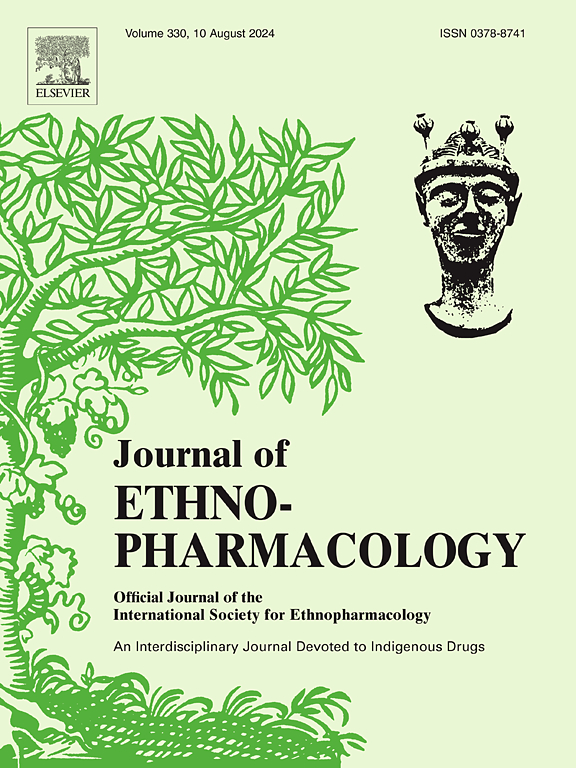Scutellaria barbata ameliorates acute respiratory distress syndrome by inhibiting neutrophil-mediated inflammatory responses
IF 4.8
2区 医学
Q1 CHEMISTRY, MEDICINAL
引用次数: 0
Abstract
Ethnopharmacological relevance
The traditional medicinal herb Scutellaria barbata D. Don (commonly known as Ban Zhi Lian) is renowned for its heat-clearing and detoxifying properties and has been used to treat inflammatory conditions and various cancers. While lung inflammation is an indication for S. barbata, its effects on acute respiratory distress syndrome (ARDS) remain unclear.
Aim of the study
Dysregulated neutrophilic inflammation plays a critical role in the pathogenesis of ARDS. In this study, we aimed to investigate the novel application of S. barbata in treating neutrophilic inflammation and ARDS. We evaluated the therapeutic potential of the ethanol extract of S. barbata (SB-EtOH) in mitigating neutrophil-driven inflammatory responses.
Materials and methods
The chromatographic fingerprint of SB-EtOH was analyzed, and its ethnopharmacological mechanisms were examined for their effects on inflammatory responses in human neutrophils. The therapeutic potential of SB-EtOH was further assessed using a mouse model of lipopolysaccharide (LPS)-induced ARDS.
Results
SB-EtOH significantly inhibited respiratory burst, degranulation, and chemotactic responses in activated human neutrophils without cytotoxic effects. Additionally, SB-EtOH attenuated phosphorylation of key inflammatory signaling molecules, Akt and p38, while reducing calcium mobilization in activated human neutrophils. In the LPS-induced ARDS mouse model, SB-EtOH reduced pulmonary neutrophil infiltration, lung tissue damage, and oxidative stress accumulation.
Conclusion
These findings suggest that S. barbata is a promising therapeutic candidate for ARDS and other neutrophil-predominant inflammatory diseases by mitigating neutrophilic inflammation.

求助全文
约1分钟内获得全文
求助全文
来源期刊

Journal of ethnopharmacology
医学-全科医学与补充医学
CiteScore
10.30
自引率
5.60%
发文量
967
审稿时长
77 days
期刊介绍:
The Journal of Ethnopharmacology is dedicated to the exchange of information and understandings about people''s use of plants, fungi, animals, microorganisms and minerals and their biological and pharmacological effects based on the principles established through international conventions. Early people confronted with illness and disease, discovered a wealth of useful therapeutic agents in the plant and animal kingdoms. The empirical knowledge of these medicinal substances and their toxic potential was passed on by oral tradition and sometimes recorded in herbals and other texts on materia medica. Many valuable drugs of today (e.g., atropine, ephedrine, tubocurarine, digoxin, reserpine) came into use through the study of indigenous remedies. Chemists continue to use plant-derived drugs (e.g., morphine, taxol, physostigmine, quinidine, emetine) as prototypes in their attempts to develop more effective and less toxic medicinals.
 求助内容:
求助内容: 应助结果提醒方式:
应助结果提醒方式:


